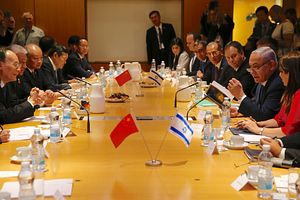Trans-Pacific View author Mercy Kuo regularly engages subject-matter experts, policy practitioners, and strategic thinkers across the globe for their diverse insights into U.S. Asia policy. This conversation with Philippe Metoudi – Founder and CEO of Duotem Capital Limited, a Hong Kong-based strategic investment consultancy firm, and co-author of Israel and China: From Silk Road to Innovation Highway – the 161st in “The Trans-Pacific View Insight Series.”
Evaluate the relevance and outcome of China’s Vice President Wang Qishan’s visit to Israel in October.
Vice President Wang’s visit to Israel is of utmost importance for several reasons. Besides being one of President Xi’s most trusted advisors, Wang is among the most knowledgeable Chinese experts on Israel’s history. Additionally, and even more importantly, his understanding of the dynamics of Israel’s high-tech ecosystem is second to none. This is widely known within the Israeli government and Wang is often referred to as a true friend and admirer of Israel. He is also the most senior Chinese official to visit Israel for close to 20 years.
Wang’s visit has further enhanced the importance of the China-Israel relationship and potentially has positioned China to participate in negotiating future peace plans in the Middle East. The delegation had representatives from both the public and private sectors, highlighting the across-the-board commitment on the part of China to its relationship with Israel.
Explain the purpose of the Israel-China Joint Committee on Innovation Cooperation (JCIC) and Vice President Wang’s role as JCIC co-chair along with Israeli Prime Minister Benjamin Netanyahu.
China has been extremely honest in saying that it can learn from a country whose entire population is less than the size of one mid-size Chinese city. China’s goal is clear: With the help of Israel, its cutting-edge technology, its entrepreneurial DNA, and its extremely efficient osmosis between universities and business world, China wants to become a world-leading technological power. The fact that this committee is co-chaired by VP Wang and PM Netanyahu demonstrates the importance of and commitment to cooperation on the part of both countries.
Identify key trends in strategic cross-border investments between Asia and Israel.
Historically, U.S. companies have been the major investors in Israel’s high technology, including companies such as Berkshire Hathaway (e.g., Iskar and Teva) and Microsoft. Last year, Intel acquired Mobileye for an astonishing $15 billion. Over the last five years, China has followed the pack of the more traditional Asian investors — Hong Kong, Japan, Korea and Singapore — to become one of the most active investors in the start-up nation.
China has shown particular interest in healthcare, cleantech (water purification, desalination, and waste management), software, and technology related to automobile manufacturing.
Owing to the very high cost of labor in Israel, local companies have been more active in using Chinese companies to manufacture their products.
What is the impact of growing cooperation between China and Israel on investment and infrastructure on the United States, Israel’s key security ally?
Indeed, the bond between the U.S. and Israel has been very strong and has become even stronger recently under the Trump administration. Because Israel has a close relationship with both China and the U.S., Israel could work to help improve relations between the two giants. A very small number of investments in strategic industries will likely remain off limits to China, but such restrictions would also apply to most other countries. Infrastructure ̶ such as bridges, tunnels, ports, and highways ̶ built by Chinese companies will continue to proliferate at an even faster pace. A large number of Chinese construction workers are already based in Israel and have been key to sustaining its economic boom.
Innovation technology is a key concern in the U.S.-China trade dispute. If U.S.–China trade relations worsen, what are U.S. foreign policy implications for Israel-U.S. relations?
As explained above, we believe that Israel could play a key role in facilitating negotiations between the two nations. There will be sensitive technology that will be off limits, but China will continue to invest across the board in the sectors described above.

































